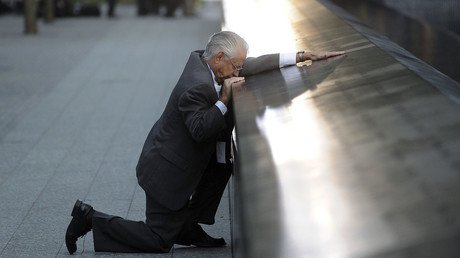'Obama vetoed 9/11 victim bill over geopolitical considerations' - survivor to RT
By vetoing a bill that would have allowed the families of 9/11 victims to sue Saudi Arabia, US President Barack Obama has disregarded thousands of victims for the sake of geopolitical interests, William Rodriguez, a survivor of the attack, told RT.
Rodriguez worked as a janitor in the North Tower of the World Trade Center, which, together with the South Tower, was hit by a hijacked aircraft in the 9/11 terrorist attacks. He has since been distinguished with several awards for helping to evacuate people from the burning building before its total collapse.
Commenting on Obama’s controversial decision to veto the ‘Sue the Saudis’ bill, Rodriguez lamented that the “president did not take into account the lives that were lost on 9/11, 3,000 people, and the people that were sick after 9/11 happened, we’re talking about 10,000 more that have been affected in the event.”
Rodriguez believes that by depriving the victims of an opportunity to seek justice, the American leader followed in the footsteps of the previous Washington administrations that prioritized geopolitical pursuits over the interests of the people.
“They are following the same code book basically to protect the interest in the region,” he argued, adding that that he thinks the main argument against the bill is not valid.
The White House said the bill would enable other countries to sue the US for its actions abroad.
“It has nothing to do with not being sued in other courts,” Rodriguez said, noting that Saudi Arabia has been funneling large amount of money to secure the loyalty of US politicians and prevent the bill from taking effect.
“At this point, the amount of money the government of Saudi Arabia has spent buying the interest and the support from politicians here to push the veto has been mind-boggling,” Rodriguez said.
“We know for a fact that we have a public relations company here and they spend around $60,000 a month basically doing a campaign against the victims of 9/11,” he said, adding that given such circumstances, the veto did not come as a surprise to the relatives and friends of the victims of 9/11 seeking justice.
READ MORE:US Senate greenlights $1.15 bn arms sale to Saudi Arabia
“We expected the veto, actually. And we are working already to override it. We are doing out campaign to get senators and congressmen to give us the support that we need to override that veto.”
The argument that the US economy could potentially lose $750 billion in the event that Saudi Arabia goes ahead with its threats to sell off Treasury securities and other American assets seems to him also not credible.
“You have experts in economics from all over the world that say it would be more damaging for the economy of Saudi Arabia if they withdraw this $750 billion,” Rodriguez said, adding that the “easier and cheaper” way out of the situation for the Saudi government would be to resolve the issue directly with the survivors.
While Rodriguez believes the possibility of the US being sued by citizens of foreign countries is only a pretext to block the legislation, he says the US should in the end be held accountable for civilian death and other criminal acts it commits not on the home soil.
READ MORE:US-made bombs used in Saudi strikes on Yemen – Amnesty
“We do policies and actions that are deterrent of terrorism but at the same time causes civil casualties, for example, in a war or in a situation that we are wrong,” Rodriguez said.
“If you do a criminal act in another country by all means you should be taken legally to a court and be accused for it,” he added, saying that there should not be a room for “a double standard” and the US “should actually pay for those liabilities… It should go both ways.”
The statements, views and opinions expressed in this column are solely those of the author and do not necessarily represent those of RT.













